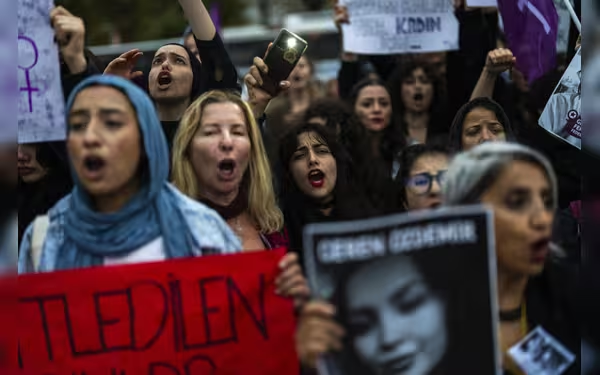Saturday, November 16, 2024 07:46 PM
Rojin K.'s Murder Sparks Outrage in Turkiye Over Femicides
- Body of missing student Rojin K. found in Lake Van.
- Protests erupt against femicides and government inaction.
- 117 women murdered in three months, alarming statistics.
 Image Credits: arabnewspk
Image Credits: arabnewspkThe body of missing student Rojin K. found, igniting protests in Turkiye over rising femicides and government inaction.
In recent weeks, Turkiye has been shaken by a series of tragic events that highlight the ongoing issue of femicides in the country. The discovery of the body of a 21-year-old university student, Rojin K., who had been missing for nearly three weeks, has intensified public outrage and protests across major cities. This incident is part of a disturbing trend, as many women in Turkiye have fallen victim to violence, prompting citizens to demand justice and change.
Rojin K. was last seen on September 27, leaving her student accommodation in the city of Van. Her body was found on the banks of Lake Van, approximately 80 kilometers from the Iranian border. The Interior Minister, Ali Yerlikaya, announced the discovery but did not provide details regarding the cause of death or confirm if she had been murdered. This lack of information has raised concerns among the public, especially given the recent spate of violent crimes against women.
The protests that erupted in response to Rojin's disappearance and subsequent death have seen hundreds of women taking to the streets, chanting slogans against the ruling AKP party and its leader, President Recep Tayyip Erdogan. The protests were ignited by a horrific incident on October 4, where two young women were killed in Istanbul by a man who later took his own life. One of the victims was decapitated, a gruesome act that has left the nation in shock.
Turkiye has been grappling with a rising tide of femicides, with reports indicating that 117 women were murdered in the three months leading up to September 30, and another 110 died under suspicious circumstances. These alarming statistics have prompted women's rights groups to call for urgent action and a return to the Istanbul Convention, an agreement aimed at preventing violence against women. Turkiye withdrew from this convention in 2021, with the government claiming it undermined traditional family values.
As protests continue, many are questioning the government's commitment to addressing violence against women. President Erdogan has promised to strengthen the justice system and take a tougher stance on crime, but many citizens remain skeptical. The anger and frustration expressed during the protests reflect a deep-seated desire for change and a safer environment for women in Turkiye.
The tragic case of Rojin K. serves as a painful reminder of the urgent need for societal change and effective measures to protect women. As the nation grapples with these issues, it is crucial for the government to listen to the voices of its citizens and take meaningful action to prevent further tragedies. Only through collective effort and commitment can Turkiye hope to create a safer future for all its women.













